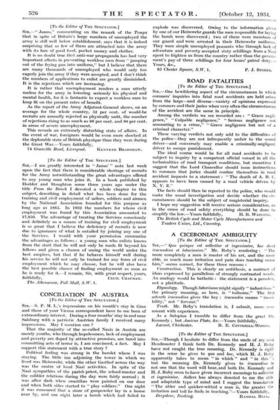ROAD FATALITIES
[To the Editor of THE SPECTATOR.]
SIR,—One bewildering aspect of the circumstances in which coroners' inquiries into fatal road accidents are held arises from the large—and diverse—variety of opinions expressed by coroners and their juries when very often the circumstances of the accident are the same in principle.
Among the verdicts we see recorded are : "Grave negli- gence," Culpable negligence," "Serious negligence not amounting to a crime," "Grave negligence but not of a criminal character."
These varying verdicts not only add to the difficulties of the police—they are not infrequently unfair to the sound driver—and conversely may enable a criminally-negligent driver to escape punishment.
The ideal course would be for all road accidents to be subject to inquiry by a competent official versed in all the technicalities of road transport conditions, but meantime I suggest that the Lord Chancellor should issue instructions to coroners that juries should confine themselves in road accident inquests to a statement : "The death of A. B. C. appears to have been caused by a road vehicle driven by x. Y. Z."
The facts should then be reported to the police, who would make the usual investigation and decide whether the cir- cumstances should be the subject of magisterial inquiry.
I hope my suggestion will receive serious consideration, as in the cause of road safety everything should be done to simplify the law.—Yours faithfully, H. R. WATLLNG. The British Cycle and Motor Cycle Manufacturers and Traders Union, Ltd., Coventry.














































 Previous page
Previous page